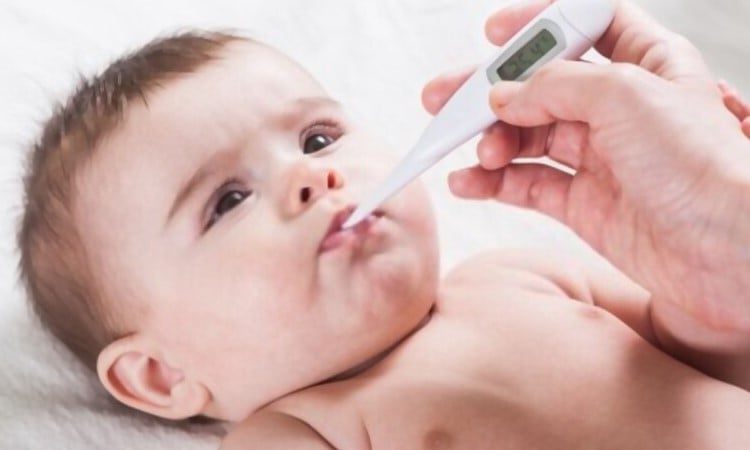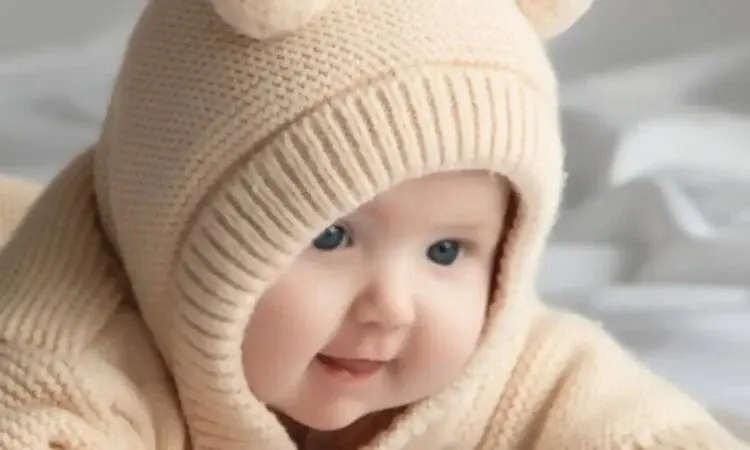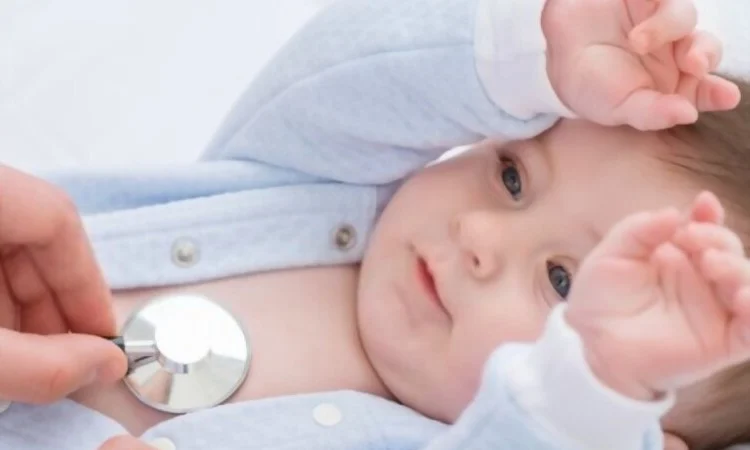Cold hands and feet in babies are quite common. This is usually nothing to worry about. The extremities of newborns are generally cold. A newborn’s circulatory system may take up to three months to adapt to life outside the womb. Meanwhile, it’s common for their tiny fingers and toes to feel cold.
As your baby becomes more active, however, his blood circulation will increase, and he will no longer have this problem with cold extremities. Still, if your child is experiencing cold hands and feet, your concern is understandable, but you shouldn’t let it cause undue stress. Read on to learn why babies have cold feet and hands.
What Causes Babies to Have Cold Hands And Feet?
A baby’s extremities, especially his hands and feet, may feel colder than the rest of his body in cold weather. However, in some cases it could be caused by a health problem that hasn’t been yet been detected.
Related Reading: 8 Must Have Fruits For Kids In Winters
The following are some of the possible explanations for cold hands and feet in babies:
1. Underdeveloped circulatory system
As their circulatory system matures, blood will eventually reach all of their tissues, but for now, it will focus on the developing vital organs like the brain, heart, and lungs. This suggests that oxygen delivery to the extremities may be compromised, leaving a baby’s hands and feet cold to touch.
In addition to oxygen, blood also transports heat throughout the body. This lack of oxygen may cause cold hands and feet in babies. Because the blood usually gets to the extremities last, it is not uncommon for newborns (especially those under the age of three months) to have cold fingers and toes.
2. Underdeveloped thermoregulation
Without additional thermal protection, newborns’ bodies would be unable to keep their internal temperature stable. Since they have a large amount of skin compared to their body weight, the rate of heat loss in infants will be high1. It is because of this risk of heat loss due to evaporation, it is recommended that you dress your newborn in extra layers that cover his or her head, legs, and hands. Underdeveloped thermoregulation may also lead to cold hands and feet in babies. It is imperative to keep your baby warm in winters.
3. Low activity level
Sleeping, eating, and absorbing nutrients take up a lot of a baby’s time. Because of all the time spent sleeping and lounging, your baby probably isn’t doing much in the way of physical activity. Obviously, this is perfectly normal and good for a baby to experience at this stage in their development. This sedentary behavior, however, could lead to cold feet and hands.
Due to the fact that babies do not move around, their limbs (arms, legs, hands, and feet) receive a lower volume of blood flow. In addition, because babies need to eat and digest every few hours, their bodies are devoting more blood to their digestive organs than they are to their hands and feet. In this case, you will notice your baby’s hands and feet are no longer cold once they begin spending more of their waking hours playing, exploring, and moving around.
When in doubt, always listen to your gut and consult your doctor about your child’s cold hands and feet, even though they are usually nothing to worry about.
Underlying Health Issues That Cause Cold Hand And Feet In Babies
Babies’ hands and feet should be rosy and toasty. When a baby’s feet are warm and pink, it means they are at a comfortable temperature. But when the baby’s feet are cold but the body is warm, that could be indicative of cold stress. When a baby develops hypothermia, another dangerous condition.
Related Reading: Are Bananas, Milk Or Curd Given To Babies When They Have Cold?
Following are some health conditions that could cause cold hands and feet in babies:
1. Fever can make babies’ hands and feet feel cold

Fever may also cause a baby’s extremities to feel cold. Your child may experience cold hands and feet if their temperature is over 100.4 degrees Fahrenheit (38 degrees Celsius). This is possible because their revamped circulatory and immune systems are preoccupied with warding off infections in other parts of their bodies. This could potentially draw warmth away from the extremities.
Low body temperature and chills are common side effects of a fever as your baby’s body attempts to maintain a healthy internal temperature. As a parent, you may find yourself in a situation in which your infant displays cold hands and feet but does not have a fever. There is no need to be concerned if your baby has cold hands and feet and no fever or other symptoms of infection or illness.
Related Reading: Top 9 Indian Home Remedies For Fever In Babies
2. Sepsis
Sepsis is a life-threatening complication of an infection. Any baby can contract an infection, and many of those infections can progress to sepsis. In order to avoid irreversible damage, early detection of sepsis is essential. Without prompt medical attention, sepsis can rapidly cause tissue damage, organ failure, and death2.
Most sepsis-causing infections begin in the lungs (pneumonia), urinary tract (UTI), skin, bones, or digestive tract. Sepsis is characterized by a number of symptoms, including but not limited to cold hands and feet, rapid heart rate, rapid breathing, pale skin, nausea, vomiting, dry diapers for more than 12 hours, and so on.
3. Problems related to blood circulation
There are a number of conditions that can affect your infant’s blood circulation, and each of these could cause your baby to experience cold hands and feet. Besides cold hands and feet, bluish lips and skin discolorations are just two of the symptoms your baby may exhibit if he or she is experiencing blood circulation issues.
Babies’ hands and feet often get cold because of issues with their blood circulation, such as:
- Congenital heart disease
- Lungs and blood circulation issues
Cold Hands And Feet In Babies- What To Do?

The treatment for cold hands and feet in babies will vary depending on the underlying cause. Do not worry if your baby occasionally experiences cold hands and feet; this is normal until they learn to regulate their body temperature.
You can regain the warmth in your baby’s limbs by doing the following things.
- Put the baby in something soft and warm; a long-sleeved top and socks are a good idea. Neither a sweater nor a blanket should be compelled upon the baby. Make sure the baby is comfortable first
- Avoid making her lie on the bed naked
- Check your baby’s temperature with a thermometer. Use extra blankets to keep her warm if her core temperature drops below 97 degrees
- If you notice that your baby’s hands are cold, but the rest of their body seems warm and fine, your worries can be put to rest
- Kangaroo mother care can effectively solve the cold hands and feet in babies3. You can help your baby’s body generate the natural heat he needs by using this technique. Take off everything your baby is wearing besides the diaper, and hold him or her close to your chest while you cuddle under a blanket
- If your baby is sleeping in a separate room, make sure the temperature is comfortable for him or her. The optimal range for a room’s temperature is from 68 to 72 degrees Fahrenheit4
- It’s best to see a doctor if your infant exhibits any unusual symptoms so that tests can be run and the appropriate treatment can be prescribed
Related Reading: New-Born Care After Delivery At Home: 9 Practical Tips
Is It Ok For Baby’s Hands And Feet To Be Cold?
It is possible for a baby to have cold hands for a variety of reasons, ranging from something as simple as the cold temperature outside to something as complex as an underlying medical condition. So, it’s important to keep a close eye on your child and find out why your baby’s fingers and toes are cold.
When Should You Go To A Doctor?

If your infant not only has cold hands but also has lips that are bluish or mottling (blotches) of blue all over their body, this could be a sign that their blood circulation is poor. This means that their whole body is probably not getting enough oxygen. Thus, such a situation calls to seek immediate medical attention.
The average body temperature of a newborn is approximately 97.52 degrees Fahrenheit. If your infant’s hands appear to be chilly, you should determine their core temperature and dress them in layers accordingly. If this doesn’t help, and you notice any of the following symptoms, you should see a doctor right away:
- Extreme tiredness
- Unexplained rashes
- Reduced hunger
- Vomiting
- Diarrhea
- Seizures
- Fuzziness
- Central body parts become cold
Conclusion
Babies rarely experience serious consequences from having cold hands and feet. Wear warm but breathable layers and keep a close eye on their core temperature by touching their tummy, torso, or the nape of their neck.
Keeping the room at a comfortable temperature and blowing warm air on their hands and feet are both good options. Babies have a special need for a warm, cozy environment. Babies often start fussing when their body temperature is just beginning to rise above or fall below the ideal range. Baby should be kept near parents and caregivers so they can respond and check on him if he becomes fussy.

